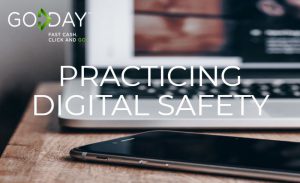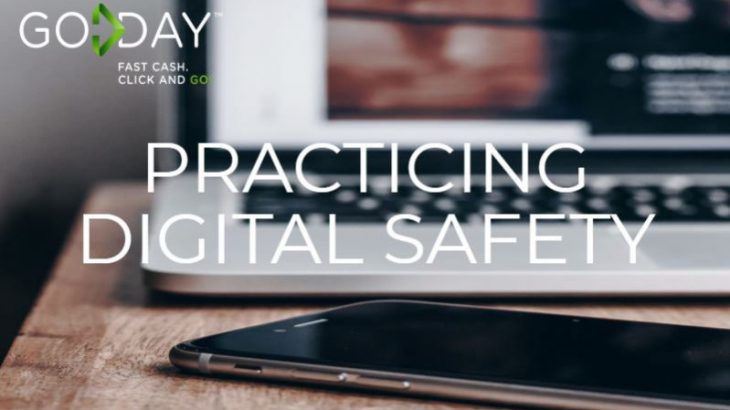
Whether we like it or not, everything is online these days. This includes us! That’s why we’re the first to understand that filing personal information online can make you feel uneasy. We’re a payday loan company, which means we take all your financial and private information seriously and it is our job to help protect the information you give to us online. Whether you’re a business or just browsing the internet casually, practicing digital safety should be a top priority. This goes beyond changing your passwords – but with technology and having mobile accessibility at your fingertips, you need to know how to protect yourself online. Speedy. Smart. Secure. That is what GoDay promises our customers. But what are you doing to make sure you’re protecting yourself online?
According to the Chartered Professional Accountants (CPA), more than 71 percent of people surveyed said that they are concerned about identity theft, which was up from 66 percent last year. Roughly 76 percent of people fear Canadian businesses are vulnerable to cyber-attacks which has their personal data, compared to 73 percent in 2017. But only 68 percent of Canadians believe that businesses are doing the best they can to safeguard the personal information of customers, down from 72 percent last year.
GoDay’s promise
Here at GoDay, we understand and value that your information is private, which is why we have security top of mind. We take our lending seriously. And your information and security is a part of our responsible lending strategies. At GoDay, we are compliant with provincial loan regulations, which means you’re protected legally with every short-term loan and cash advance. Our customer service representatives can also help to answer any questions you may have with respect to your privacy, your obligations, and your rights.
Don’t be fooled
So what should you never do? Make sure your passwords are secure and you’re not storing or sharing personal information such as credit card numbers, your SIN number, bank account information, or anything else you want people to see on your computer or in your email. Deceptive emails, which are also known as phishing scams, happen all year and can be after any of your information. Don’t be fooled by official names or logos as this is one of the most common ways that phishing scams will try to seem official. Make sure you pay attention to the email addresses and websites, because they will seem official, but there will usually be a letter, number or sign that shouldn’t be used to indicate that it’s not official.
Passwords and PINS
A strong password can make the difference between you and identity theft. But we understand that absolutely everything requires a password these days. And not to mention, there are so many different types of passwords we are asked for. Capital letters, numbers, characters, who can keep track of them all? Luckily, there are tools out there to not only store your passwords for websites, but they can also help you create them and let you know when a good time to change it is. It is also good to make sure you’re not using the same password for all of your accounts. For instance – are you using the same passwords for your social media accounts and your banking? This means if someone finds out your password for one site, they will try it on everything else and this could mean having access to and losing private and confidential information. That’s why it is recommended to use similar passwords (so you remember them), but to mix them up depending on what you’re using them for and to change or update them regularly.
Watch your credit score
So what does your credit score have to do with protecting your identity online? Your credit report is one of the easiest ways to see if a new loan or account has been opened in your name or if someone is using your personal information to try and access accounts. Your payment history and monitoring your spending is what makes up your credit score, and there are times where credit card companies will notice irregular purchases or spending and flag your account. That is why it is also good to also let your bank know when you’re traveling, so they don’t think that someone in a different country is using your cards and identity fraudulently. Credit card companies also now have online tools and mobile apps to help you see transactions and have immediate access to your credit score and other financial information.
What to do if you’re a victim of fraud?
There are many ways you can actively protect yourself as a consumer when it comes to fraud but a lot of people don’t know what to do in these situations. That’s why CPA Canada published Protecting You and Your Money: A Guide to Avoiding Identity Theft, a resource guide to help consumers recognize when they could be a victim of fraud, how to avoid becoming a victim and if you are a victim of fraud, the next steps and how to report it. If you think you’ve been victim to a scam, make sure to contact your bank immediately to look into your account information. You should also contact your local police and the Canadian Anti-Fraud Centre.
Identity theft, types of fraud, counterfeit money and other threats or scams, these are only a few of the many types of fraud you can fall victim to. To make sure you’re doing your part in protecting your identity online, follow the tips we’ve discussed. You can also visit the Government of Canada website for protection from the many different types of fraud and scams you may have fallen victim to.



